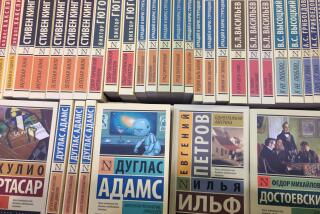Breakup of Soviet Union Tongue-Ties New Republics
- Share via
KIEV, Ukraine — Three years ago, Leonid Kuchma spoke only Russian in public and could barely form a sentence in Ukrainian. Now, as Ukraine’s president, he speaks only Ukrainian.
At least, he tries to.
“He speaks ‘Kuchmese,’ a kind of Ukrainian with Russian words thrown in when he can’t think of the translation,” complains Olena Timoshenko, a language instructor.
Kuchmese makes good joke fodder, and it’s also a high-profile example of the linguistic dilemma facing millions of people across the former Soviet Union, where the Russian language once ruled.
The breakup of the Soviet empire created 15 independent countries. After decades of suppression under Soviet rule and before that czarist regimes, local languages are being revived, even if citizens are a bit rusty and, in some cases, the languages are poorly suited for modern life.
Language issues galvanized independence movements from the Baltics to Central Asia before the 1991 collapse of the Soviet Union. But trying to forge new national identities with old languages has proven a tricky task.
And it’s left a trail of tired tongues.
Political scientist Nurbulat Masanov wants no part of the drive to promote Kazak, a Turkic language of nomads, in the Central Asian nation of Kazakstan.
“There are dozens of words to describe a camel” in Kazak, he said. “There are no words for modern technology or science.”
Kazakstan is home to more than 100 ethnic groups, and just 35% of the population speaks Kazak, while a solid majority speaks Russian. Many people fear government efforts to make Kazak the official language will threaten the delicate balance among the ethnic groups.
In neighboring Kyrgyzstan, Yevgenia Tarasenko had to leave her job at a television station when the management ordered all staff meetings to be held in Kyrgyz.
“I told them I was willing to learn Kyrgyz, but I couldn’t do it from one day to the next,” said Tarasenko, a Russian speaker.
The station’s plan bombed because not enough employees spoke decent Kyrgyz. It soon switched back to Russian and asked Tarasenko to return.
The millions of Russians scattered across the former Soviet territory are particularly wary of these word games. They are often targeted by nationalist language policies, a sort of revenge for the Communist Party drive to create a Russian-speaking union.
Then there’s the problem of multiethnic households, a widespread product of Soviet-era deportations and relocations. What do you do when Mom speaks Russian, Dad speaks Moldovan, Grandma speaks Belarusian, and the kids are learning Uzbek in school?
For Masanov, the Kazak political scientist, practicality should win out over politics when it comes to language.
“Frankly, I don’t care whether my children learn Kazak,” he said. “I want them to know English.”
The tiny Baltic nations have scrambled to forget Russian as fast as they once learned it. Just five years after their independence from Moscow, Estonians, Latvians and Lithuanians are more likely to say “goodbye” than “do svidanya.”
Back in Ukraine, Kuchma’s linguistic flubs may peeve purists, but no one denies that his perseverance has done wonders for reviving Ukrainian, a melodic Slavic language sometimes dismissed as a backwoods dialect.
Speaking publicly in Ukrainian was a daring move for Kuchma, a former nuclear missile plant director who grew up speaking only Russian in heavily Russified eastern Ukraine.
As prime minister in 1993, he still spoke only in Russian. But when he began campaigning for president the following year, out came his Ukrainian.
Critics ridiculed his rough Russian accent. They trashed him for littering his speech with Russian words cheaply disguised with Ukrainian suffixes.
The country’s Russian speakers--the bulk of his supporters--had a bitter surprise after his election victory.
Instead of championing Russian-language rights, Kuchma stopped speaking Russian altogether, at least in public. He even pushed to make Ukrainian the only state language.
Some say his efforts have backfired, producing a head of state who sounds less intelligent than he is. Students compete to count his grammatical mistakes. One group reportedly created its own glossary of the president’s peculiar phrasings.
But not everyone is critical.
“Would I want my kids to sound like Kuchma? No,” said Irina Rylchik, a Ukrainian mother of two. “But good for him for trying.”
More to Read
Sign up for Essential California
The most important California stories and recommendations in your inbox every morning.
You may occasionally receive promotional content from the Los Angeles Times.













